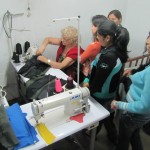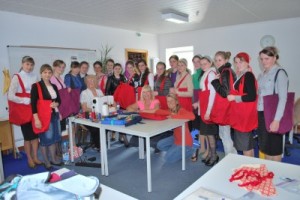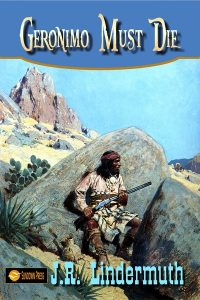Retirement Can Change Your Life – Or Someone Else’s Life.
Retirement. That word means different things to different people. And it means different things to an individual at different times of his or her life.
Some see it as an opportunity to travel, to go places time has not permitted in the past. Others see it as a time to kick back and do nothing, watch more TV, read more books, get in a daily siesta, join a coffee klatch with other retirees, or have no schedule at all.
at all.
How many retirees use the additional free time to improve their golf game, or develop a better bridge game. Others use the new-found time to work with charitable organization.
But some choose to use their skills to train or otherwise help people in need.
Sylvia had begun sewing as a child, making her own doll clothes. She continued as an adult, making her husband’s suits, ties and shirts. After awhile, Sylvia Remple began teaching sewing and eventually opened a clothing manufacturing business. It grew quickly and before long she had three hundred employees. In 1982, her company, Sun Ice, outfitted the first team of Canadians to conquer Mount Everest. Two years later, her company was awarded the contract to outfit many Canadian teams for the Winter Olympics in Los Angles. Following that success, Sun Ice became the Official Clothing Supplier to the Winter Olympics hosted by Canada
In 2001, Sylvia Remple sold the business. Retirement. What to do now?
About the same time, she became aware of the poverty in Sierra Leone and in particular, the desperate circumstances for some women. She came up with an idea.
Sylvia and daughters Tammy and Angela formed Sewing Seeds International – SSI. Its mandate was to create self sustaining sewing schools in impoverished areas, empowering women, bringing hope for a better future.
 The first project was in Sierra Leone. SSI secured backing from some companies, purchased sewing machines and materials. In Sierra Lione, they found a place to hold classes, then advertised for women who wanted to learn a skill that would help them toward a better future.
The first project was in Sierra Leone. SSI secured backing from some companies, purchased sewing machines and materials. In Sierra Lione, they found a place to hold classes, then advertised for women who wanted to learn a skill that would help them toward a better future.
The classes were intense. Sylvia also realized that to keep attendance and attention at a high level, the school must provide care for the many young children of the students. So, day care was provided, including meals.
At the end of the three week classes, the machines were left in the classrooms and the women were encouraged to continue working on their sewing skills.
A few months later, these same women were given another three-week school, introducing them to more advanced skills. Again, the machines were left for the students to practice and make clothes for their children and themselves.
A third course was offered. Now, the students were capable of using patterns and making items for sale. But most important for the Sewing Seeds mandate, the best students were trained so they could teach classes to other women.
The success of the school encouraged SSI to move into other countries. Classes have been given in Africa, Europe, South America, and Mexico.
Has it been successful?
Absolutely. All can make clothes for their families. Many of the women now make a decent living sewing for others. Several have formed companies to manufacture  clothes. One graduate now has a company with eight other women working, all making a decent living. Graduates of another school formed a co-op which now has a contract to supply all the uniforms for a school system in a nearby larger town.
clothes. One graduate now has a company with eight other women working, all making a decent living. Graduates of another school formed a co-op which now has a contract to supply all the uniforms for a school system in a nearby larger town.
Because they are set up to be self-sustaining, these schools should bear fruit for years to come. The Canadian government has recognized SSI as a certified charitable organization. In many places around the world, SSI is recognized as a life-saver.
Is Sylvia bored in her retirement? Not even a little. Her compensation? Seeing impoverished women now able to be self-supporting, infused with hope for a brighter future. That’s better than a paycheck.
What is her retirement? To help others.
While going into extremely poor, perhaps desperate, areas may not seem like a fun thing to do in retirement, it must be extremely rewarding and give one a true sense of worth that a game of golf probably won’t.
Sylvia would tell you she has found the perfect retirement.
What do you see for yourself in retirement? Leave a comment on your retirement.


 heroine of A Ton of Gold and A Silver Medallion. Hello, Eula. How are you today?
heroine of A Ton of Gold and A Silver Medallion. Hello, Eula. How are you today? JIM: This past year, she went down to Mexico to rescue some young girls. What did you think about that? I mean, she doesn’t seem like the adventure-seeking type to me.
JIM: This past year, she went down to Mexico to rescue some young girls. What did you think about that? I mean, she doesn’t seem like the adventure-seeking type to me.

 I never had a problem with any of this class.
I never had a problem with any of this class. “This might be too tiring for the pig,” she continued. “I must insist you allow a rest period every five minutes.” I suggested every fifteen minutes and we ultimately compromised on ten minutes. I wondered how effective this would be. Would the pig understand a rest period?
“This might be too tiring for the pig,” she continued. “I must insist you allow a rest period every five minutes.” I suggested every fifteen minutes and we ultimately compromised on ten minutes. I wondered how effective this would be. Would the pig understand a rest period?
 Though close to eighty students had signed up, there were probably only fifty on the starting line. Possibly some had second thoughts after seeing this ferocious looking bovine. But there were probably another two hundred and fifty spectators. On the count of three, the rope was dropped and the door to the cage thrown opened.
Though close to eighty students had signed up, there were probably only fifty on the starting line. Possibly some had second thoughts after seeing this ferocious looking bovine. But there were probably another two hundred and fifty spectators. On the count of three, the rope was dropped and the door to the cage thrown opened.
 don’t have the abundance of coin operated, self serve laundromats. And often, to have the laundry done at a commercial shop may take longer than we will be in that town. We tend to stay away from home for long periods, but to stay in one town only a short period. Ah, the little problems. We need to plan ahead and decide that since we are planning on being in this town for five days, we can send the laundry out.
don’t have the abundance of coin operated, self serve laundromats. And often, to have the laundry done at a commercial shop may take longer than we will be in that town. We tend to stay away from home for long periods, but to stay in one town only a short period. Ah, the little problems. We need to plan ahead and decide that since we are planning on being in this town for five days, we can send the laundry out. need to do some laundry. And after checking around, we found a laundry (not self-serve) that would do the laundry for you and return it the next day. Great. My wife, Earlene, explained in her best Spanish, no planchada. No ironing. She tried again. No planchas. You don’t iron.
need to do some laundry. And after checking around, we found a laundry (not self-serve) that would do the laundry for you and return it the next day. Great. My wife, Earlene, explained in her best Spanish, no planchada. No ironing. She tried again. No planchas. You don’t iron.
 16 novels, including six in his Sticks Hetrick crime series, plus a non-fiction regional history. His short stories and articles have been published in a variety of magazines. He is a member of International Thriller Writers and is a past vice president of the Short Mystery Fiction Society. He currently serves as librarian of his county historical society, where he assists patrons with genealogy and research
16 novels, including six in his Sticks Hetrick crime series, plus a non-fiction regional history. His short stories and articles have been published in a variety of magazines. He is a member of International Thriller Writers and is a past vice president of the Short Mystery Fiction Society. He currently serves as librarian of his county historical society, where he assists patrons with genealogy and research